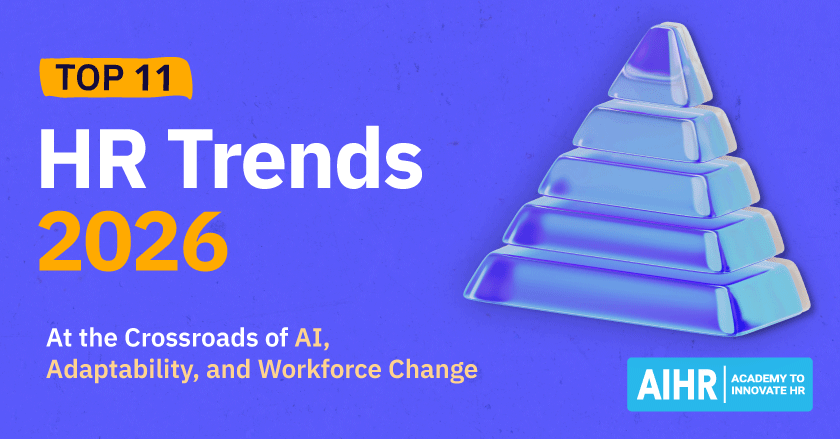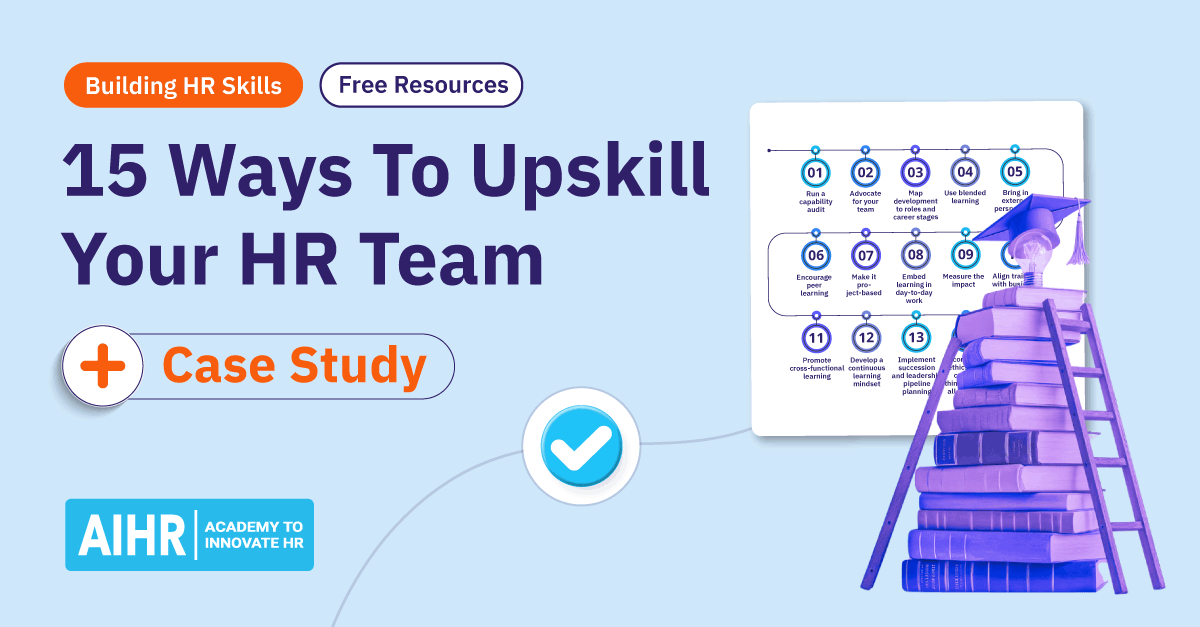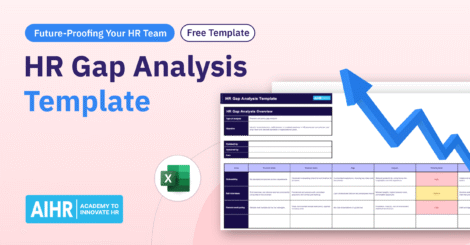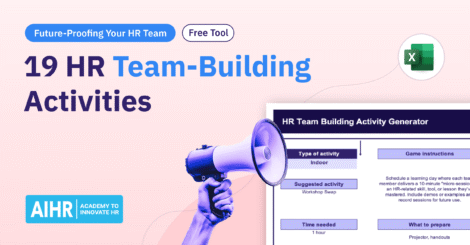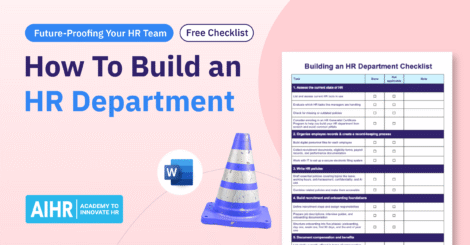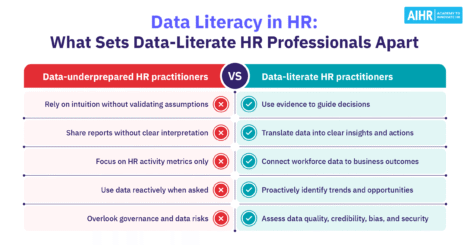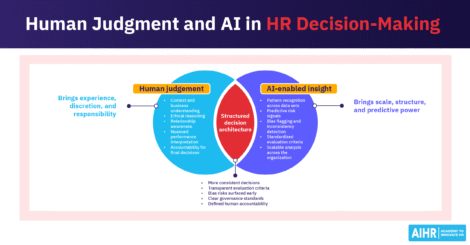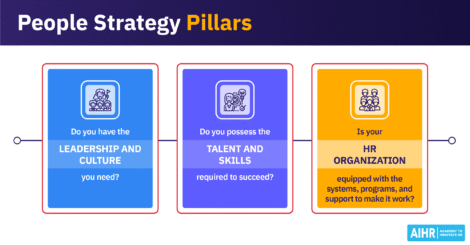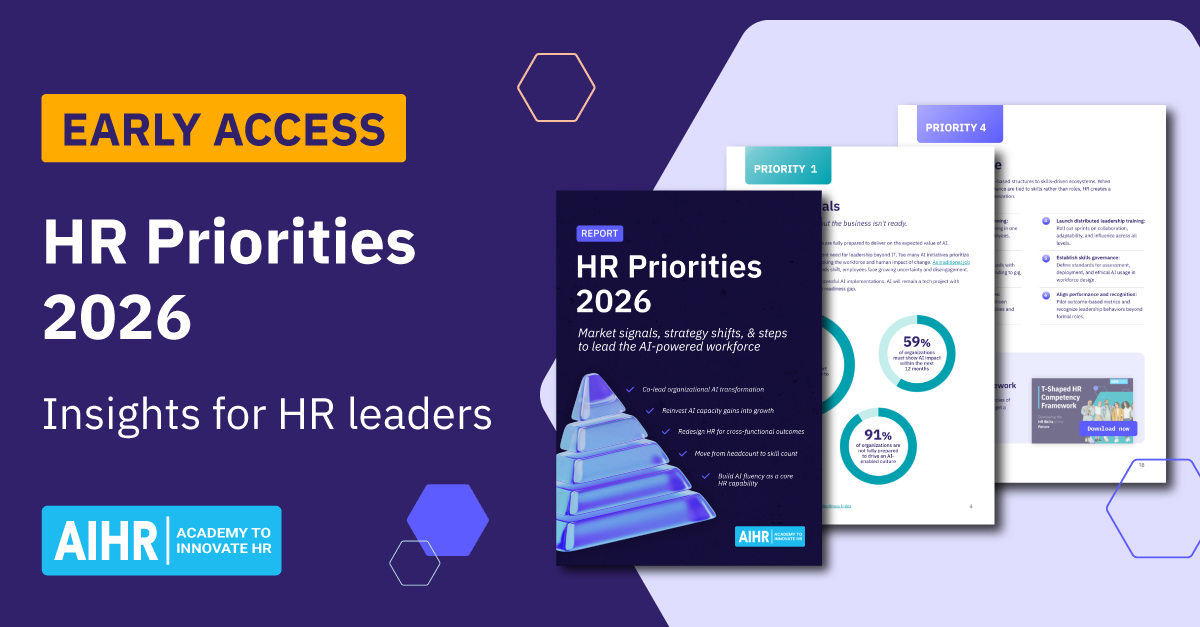A practical HR training and development program is critical. According to AIHR’s research, 74% of HR practitioners want to learn new skills, but only a fraction of HR teams have the competencies to meet rising business demands. In fact, 79% of HR professionals aren’t equipped to handle upcoming workforce challenges.
The reality is that HR has evolved from a process-driven function to a strategic driver of business success, and traditional training methods are falling short. Today’s HR teams need targeted, dynamic learning that addresses the demands of AI, data analytics, digital transformation, and organizational change leadership.
Contents
Why HR training and development requires a targeted approach
HR training topics to focus on
15 ways to build an effective HR training and development program
Case study: How HumanX transformed HR capabilities with targeted learning
Why HR training and development requires a targeted approach
HR teams are facing more complex expectations today. As organizations navigate rapid growth, restructuring, culture change, and new technologies, HR has shifted from a support function to one expected to lead with insight, agility, and credibility.
However, only 41% of HR professionals have the digital agility to keep pace with HR’s digital transformation, and nearly half of managers don’t feel confident in developing their people.
When expectations rise but capabilities fall behind, training becomes a strategic necessity, not an optional perk. Effective HR training must reflect HR teams’ real challenges and their unique operations. Here’s why.
HR professionals already know the playbook
Unlike most employees, HR teams frequently design, deliver, or oversee workplace training. They understand the typical learning frameworks, engagement techniques, and competency models. As a result, they’re not easily engaged by standard content that reviews theories or shares surface-level insights.
For HR professionals, effective training must go deeper, challenge their thinking, introduce fresh perspectives, and offer advanced tools or practices beyond what they deliver to others.
Theory isn’t enough
HR teams aren’t just learning for personal development. They want to immediately apply what they learn to support employees, influence leaders, and improve processes. Training must be practical, with concepts that translate into actionable strategies or techniques.
Whether they learn to analyze workforce data, navigate change management, or design equitable performance frameworks, the learning experience must connect to their real-world responsibilities. Generic or overly theoretical content will fail to capture their attention or deliver value.
The bar for strategic capability keeps rising
HR teams are expected to advise leadership, influence business strategy, and drive measurable outcomes. Their role has expanded from managing hiring, compliance, and payroll processes to shaping culture, boosting engagement, supporting innovation, and future-proofing the business against workforce trends.
This strategic mandate requires development programs focusing on advanced skills like consulting with senior leaders, using analytics for decision-making, and managing complex stakeholder relationships.
The HR function is evolving
From AI and automation in recruitment and learning to advanced data analytics for workforce planning, evolving DEI practices, and new hybrid work models, HR professionals must constantly update their knowledge and skills.
This requires forward-looking and flexible training, equipping HR teams to understand and respond to emerging trends rather than reinforcing existing practices.
HR teams aren’t a single audience
HR teams are diverse. They include generalists, specialists (talent acquisition, learning and development, compensation and benefits, HR tech, and employee relations), and leaders, all with different experience levels and learning needs.
Effective training programs must account for this variety, offering pathways or modules for various roles, seniority levels, and aspirations. Targeted learning ensures relevance, while one-size-fits-all approaches risk being too basic for some or too advanced for others.
Let’s take a look at how the HR landscape and skills needs have changed:
Policy enforcement
Business partnership and strategic thinking
Administrative efficiency
Data literacy and people analytics
Basic recruitment and onboarding
Employer branding and proactive talent sourcing
Compliance and legal knowledge
Risk mitigation with tech, AI, and ethical frameworks
Standardized performance management
Coaching, feedback, and agile performance strategies
Transactional communication
Influencing, storytelling, and cross-functional collaboration
Training coordination
Learning design, facilitation, and upskilling strategy
Basic tech use (HRIS, payroll systems)
Systems thinking, HR tech optimization, AI tool evaluation
One-size-fits-all solutions
Tailored, employee-centric solutions
Focus on internal processes
Focus on employee experience and business outcomes
Conflict resolution and grievance handling
Organizational change leadership and cultural transformation
Reactive workforce planning
Strategic workforce planning and scenario modelling
Managing employee relations
Building inclusive, psychologically safe workplaces
Event-based engagement (e.g., annual surveys)
Continuous listening and dynamic engagement strategies
Supporting managers with HR tasks
Enabling managers as people leaders and culture carriers
HR training topics to focus on
According to AIHR’s research, HR priorities and competencies do not match, and this gap is becoming a major blocker to employee experience. So, how do you build versatile, future-focused skillsets within HR teams to meet the new demands of their roles?
Selecting the proper training isn’t just about filling immediate skills gaps; it’s about anticipating the future of work and aligning learning with where your organization and the broader industry are headed. This approach ensures your investment in HR development benefits your HR professionals and their careers, and the business as a whole.
Focus area: Strategic HR
Key topics
- Strategic workforce planning
- Aligning HR with business goals
- Organizational strategy and design
Results: HR leaders must shape workforce strategies that support business growth, resilience, and innovation. Training in this area strengthens HR’s ability to influence executive decision-making and anticipate future talent and organizational needs.
Recommended training: HR Boot Camp
Focus area: Organizational development
Key topics
- Organizational design and effectiveness
- Culture shaping and transformation
- Leadership development
Results: Organizations face continuous change, from mergers and restructuring to digital transformation. HR must lead these shifts by designing effective structures, fostering adaptive cultures, and building leadership capacity at all levels.
Recommended training: Organizational Development Bootcamp
Focus area: Business partnering
Key topics
- Stakeholder management
- Consulting and advisory skills
- Driving value through HR initiatives
Results: HR Business Partners (HRBPs) are no longer service providers; they are trusted advisors and strategic consultants, and the right training equips them with skills to understand business drivers, challenge assumptions, and co-create solutions with leaders.
Recommended training: HRBP Bootcamp
Focus area: Artificial Intelligence for HR
Key topics
- Generative AI in HR
- Ethical AI use
- Automation and augmentation of HR tasks
Results: AI is reshaping how HR tasks are done, from candidate screening to employee engagement analysis. HR teams must harness AI’s potential while managing risks and maintaining fairness and transparency.
Recommended training: AI for HR Bootcamp
Focus area: Change management
Key topics
- Change leadership
- Communication planning
- Managing resistance
Results: Change is constant, and HR is the ideal partner to manage and lead transitions, helping employees adapt, maintaining engagement, and ensuring transformation delivers the intended outcomes.
Recommended training: HRBP Bootcamp and Organizational Development Bootcamp
Focus area: Data and technology
Key topics
- HR tech evaluation and implementation
- Digital transformation readiness
- Process automation
Results: From AI-driven recruitment tools to automated performance management systems, technology is already embedded in HR, and HR professionals need the knowledge to select, implement, and optimize technology that enhances efficiency and employee experience.
Recommended training: Digital HR 2.0 Certificate Program
Focus area: People analytics
Key topics
- Data-driven decision-making
- Workforce metrics and KPIs
- Predictive analytics for talent trends
Results: Data is the foundation of modern HR strategy, and people analytics let HR teams make evidence-based decisions, identify trends, and demonstrate the ROI of HR initiatives to business leaders.
Recommended training: Data Bootcamp
Focus area: HR soft skills
Key topics
- Creative problem-solving
- Active listening and empathy
- Conflict resolution and negotiation
- Influencing and storytelling
Results: While technical skills are essential, soft skills empower HR professionals to navigate interpersonal dynamics, build trust with stakeholders, and lead with empathy — all qualities valued in today’s workplaces.
Recommended training: HR Bootcamp, HRBP Bootcamp, Organizational Development Bootcamp
Focus area: Talent acquisition
Key topics
- Proactive sourcing
- Employer branding
- Recruitment marketing.
Results: As competition for talent increases, HR must go beyond filling vacancies to building talent pipelines and strengthening employer reputation.
Recommended training: Talent Acquisition Bootcamp
A comprehensive HR training and development program is crucial for HR consistency and efficiency. This requires structured learning paths, clear standards, and continuous upskilling opportunities.
With AIHR for Business, you can enable HR leaders to:
✅ Design tailored training curricula and select appropriate delivery methods
✅ Create supporting resources to maximize program impact and learning outcomes
✅ Align HR initiatives with broader business strategies and drive measurable business value
🎯 Deliver top HR outcomes with effective training and development.
15 ways to build an effective HR training and development program
Creating an HR training and development program that equips your team for today’s strategic challenges requires more than choosing a few courses. It demands a thoughtful, structured approach that aligns with business goals and the professional growth of HR team members. Here’s how to design a program that delivers real value.
1. Run a capability audit
Assess your HR team’s skills against current and future business needs, including technical HR skills, soft skills, strategic core competencies, and emerging areas like data literacy and AI fluency.
Using a competency framework like the T-Shaped HR Competency Model can help you assess individuals and the team more consistently across both depth and breadth of capability.
Use surveys, interviews, self-assessments, and input from business leaders to identify gaps and strengths. The results may surprise you. For example, while 95% of CHROs prioritize HR digitalization, only 41% of HR professionals possess data literacy skills.
2. Advocate for your team
HR teams (and their companies) often prioritize developing others over their own growth. Make the case for investing in HR training by showing how it will improve talent acquisition, workforce planning, engagement, and alignment between people and business strategies.
Link training outcomes to business metrics like retention, productivity, and innovation to secure resources.
3. Map development to roles and career stages
A generic training program won’t serve the diverse needs of the HR team. Instead, design different learning paths based on roles and career stages.
For example, generalists need broad foundational skills, HR Business Partners (HRBPs) require strategic advisory capabilities, center of excellence (COE) specialists should focus on deep functional expertise, and emerging leaders must develop management and influence skills.
Tailoring development this way ensures training is relevant, actionable, and aligned with both individual growth and organizational goals.
4. Use blended learning
Adults learn best when given choice and flexibility. To achieve this, combine multiple learning formats to cater to different learning styles and schedules:
- Live workshops for hands-on learning and interaction
- On-demand courses for self-paced development
- Boot camps for intensive, focused skill-building around a specific topic
- Cohort-based programs to build peer networks and shared accountability
- Mentoring and coaching for personalized growth and support.
5. Bring in external perspectives
Internal knowledge is valuable, but HR teams need fresh thinking to stay ahead. Hearing from guest speakers, thought leaders, and industry experts will encourage attendance at conferences and workshops.
Industry case studies and research reports are also a great tool to expose HR teams to how other organizations solve similar challenges and will inspire creativity and innovation.
6. Encourage peer learning
Create structured opportunities for team members to share insights from external courses, projects, books, and podcasts. Peer learning sessions can include roundtables to discuss trends, challenges, and best practices, building a learning culture, and ensuring knowledge circulates throughout the team, not just within individual learners.
7. Make it project-based
Training should translate into action. Project-based learning deepens understanding and delivers tangible business outcomes, so assign projects where learners can apply new skills, from redesigning the employee onboarding experience to creating an HR dashboard, or developing a new performance feedback process.
8. Embed learning in day-to-day work
For learning to stick, it needs to be part of everyday activities:
- Encourage regular reflection on new skills
- Include learning discussions in team meetings
- Tie learning goals to performance reviews
- Make room for employees to apply new skills in their day-to-day work, without framing it as extra effort or a burden on their time.
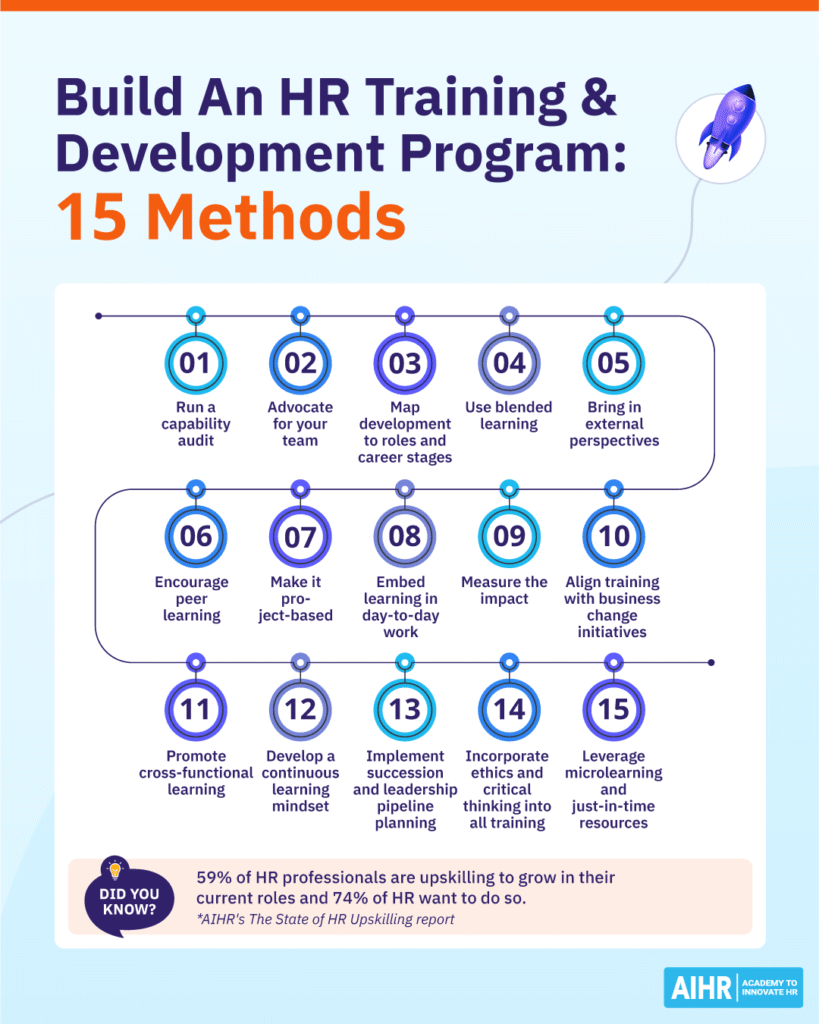
9. Measure the impact
Track the impact of your training efforts, not just course completions, but fundamental changes:
- Pre- and post-training self-assessments of skills and confidence
- Peer and manager feedback on how training improves performance
- Behavioural observations to identify shifts in HR professionals’ operations
- Project outcomes linked to learning objectives.
10. Align training with business change initiatives
Integrate HR training with current or upcoming business initiatives (e.g., new HR tech implementation, restructuring, entering new markets) to ensure learning is relevant and contributes to the organization’s priorities.
11. Promote cross-functional learning
Encourage HR team members to learn from other departments, like Marketing (for employer branding), Finance (for compensation strategy), or IT (for HR tech optimization). This broadens business acumen and strengthens HR’s role as a cross-functional partner.
12. Develop a continuous learning mindset
Encourage curiosity and self-directed learning by recognizing and rewarding staff who actively seek new knowledge and approach their work innovatively. A culture that welcomes experimentation and sees setbacks as valuable learning experiences, not failures, can accelerate individual growth, and drive team innovation and agility.
13. Implement succession and leadership pipeline planning
Design your training program with a long-term view beyond immediate skill development to actively shape your future leadership bench. Start by identifying high-potential HR team members early and provide them with a structured mix of advanced learning opportunities, leadership coaching, and stretch assignments that challenge and expand their capabilities.
14. Incorporate ethics and critical thinking into all training
As technology, particularly AI, becomes more embedded in HR processes, ethical judgment and critical thinking are essential skills. Rather than isolating ethics as a separate training topic, embed it across all learning initiatives, from data handling and hiring decisions to performance reviews and leadership development.
Encourage teams to question assumptions, weigh risks, and consider the human impact of their choices. This approach helps build a culture of thoughtful, responsible decision-making—one that supports fairness, transparency, and trust across every part of the employee experience.
15. Leverage microlearning and just-in-time resources
Microlearning strategies provide easily accessible, bite-sized learning resources that HR team members can engage with at the moment of need. This approach caters to busy professionals by delivering focused, actionable content.
These include quick-reference guides, short videos, podcasts, interactive modules, and downloadable templates, each reinforcing formal training and supporting real-time problem-solving.
Case study: How HumanX transformed HR capabilities with targeted learning
The challenge: As a growing HR consultancy, HumanX recognized that to meet rising client expectations and stay ahead in a changing HR landscape, its HR consultants needed more than foundational knowledge. They required deeper strategic capabilities, advanced analytics skills, and the ability to advise clients on cutting-edge HR practices, including AI, people analytics, and organizational design. Traditional training options weren’t delivering the practical, business-focused development the team needed.
The solution: HumanX partnered with AIHR to build a targeted, career-stage aligned learning strategy:
- They conducted a skills audit to identify gaps in people analytics, HR tech optimization, and business consulting
- They mapped learning to different career stages, ensuring generalists, specialists, and senior consultants had a relevant pathway
- A blended learning approach combined AIHR’s on-demand bootcamps with peer learning, mentoring, and real-world projects
- To keep the team engaged, training content was practical, action-oriented, and tied to individual growth and client outcomes
- HumanX leaders championed the program internally, securing resources and embedding learning into daily work, including project-based application and team learning check-ins.
The results:
- The team reported significant growth in confidence in strategic HR, people analytics, and consulting skills
- HumanX now offers clients more data-driven, tech-enabled solutions, driving stronger business outcomes
- The organization has built an internal learning culture where continuous development is the norm.
To sum up
As HR’s mandate advances, investing in HR training and development is a business imperative. HR now faces expectations in strategic workforce planning, digital transformation, data-driven decision-making, and cultivating adaptive, human-centric workplaces. Without targeted, future-focused development, even experienced HR pros risk falling behind modern demands.
Organizations can unlock their HR teams’ full potential by aligning learning with business strategy, nurturing continuous growth, and empowering HR professionals to develop functional and core competencies, enhancing HR’s ability to drive business outcomes and build a resilient, future-ready workforce to lead through change.


